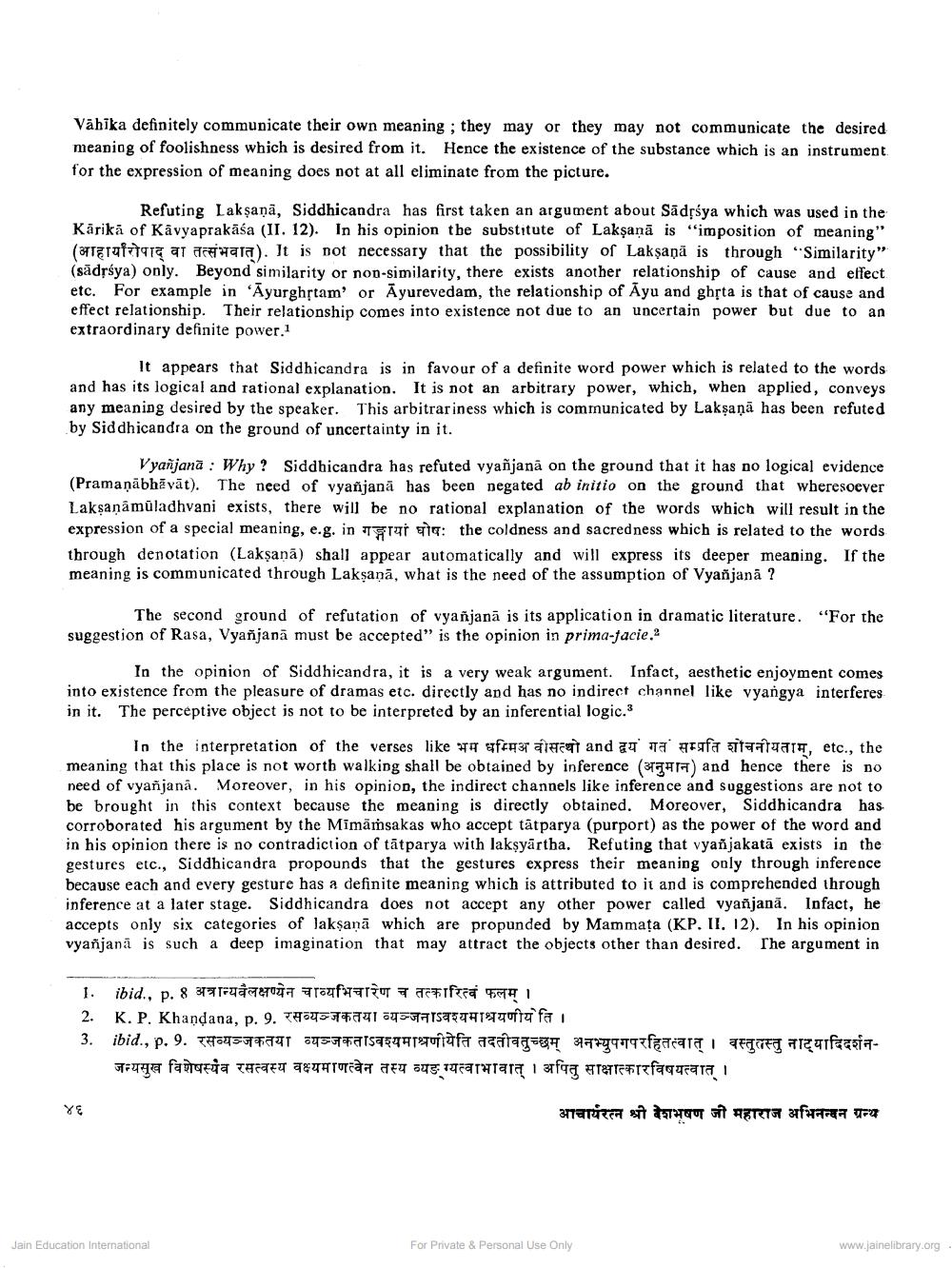Book Title: Exposition of Sabda Shaktis by Siddhichandra Gani Author(s): Satyapal Narang Publisher: Z_Deshbhushanji_Maharaj_Abhinandan_Granth_012045.pdf View full book textPage 3
________________ Vähika definitely communicate their own meaning; they may or they may not communicate the desired meaning of foolishness which is desired from it. Hence the existence of the substance which is an instrument for the expression of meaning does not at all eliminate from the picture. Refuting Lakṣaṇa, Siddhicandra has first taken an argument about Sadṛśya which was used in the Karika of Kavyaprakāśa (II. 12). In his opinion the substitute of Lakṣaṇā is "imposition of meaning" (grana). It is not necessary that the possibility of Laksana is through "Similarity" (sadṛśya) only. Beyond similarity or non-similarity, there exists another relationship of cause and effect etc. For example in 'Ayurghṛtam' or Ayurevedam, the relationship of Ayu and ghrta is that of cause and effect relationship. Their relationship comes into existence not due to an uncertain power but due to an extraordinary definite power.1 It appears that Siddhicandra is in favour of a definite word power which is related to the words and has its logical and rational explanation. It is not an arbitrary power, which, when applied, conveys any meaning desired by the speaker. This arbitrariness which is communicated by Lakṣaṇā has been refuted by Siddhicandra on the ground of uncertainty in it. Vyanjana: Why? Siddhicandra has refuted vyañjana on the ground that it has no logical evidence (Pramaṇābhāvāt). The need of vyañjana has been negated ab initio on the ground that wheresoever Lakṣaṇāmūladhvani exists, there will be no rational explanation of the words which will result in the expression of a special meaning, e.g. in : the coldness and sacredness which is related to the words through denotation (Lakṣaṇā) shall appear automatically and will express its deeper meaning. If the meaning is communicated through Lakṣaṇā, what is the need of the assumption of Vyañjanā ? The second ground of refutation of vyañjana is its application in dramatic literature. "For the suggestion of Rasa, Vyañjana must be accepted" is the opinion in prima-facie.2 In the opinion of Siddhicandra, it is a very weak argument. Infact, aesthetic enjoyment comes into existence from the pleasure of dramas etc. directly and has no indirect channel like vyangya interferes in it. The perceptive object is not to be interpreted by an inferential logic.3 In the interpretation of the verses like भम धम्मिअ वीसत्यो and द्वयं गतं सम्प्रति शोचनीयताम्, etc., the meaning that this place is not worth walking shall be obtained by inference () and hence there is no need of vyanjana. Moreover, in his opinion, the indirect channels like inference and suggestions are not to be brought in this context because the meaning is directly obtained. Moreover, Siddhicandra has corroborated his argument by the Mimämsakas who accept tatparya (purport) as the power of the word and in his opinion there is no contradiction of tatparya with lakṣyartha. Refuting that vyañjakatā exists in the gestures etc., Siddhicandra propounds that the gestures express their meaning only through inference because each and every gesture has a definite meaning which is attributed to it and is comprehended through inference at a later stage. Siddhicandra does not accept any other power called vyañjana. Infact, he accepts only six categories of lakṣaṇa which are propunded by Mammața (KP. II. 12). In his opinion vyañjana is such a deep imagination that may attract the objects other than desired. The argument in 1. ibid., 2. K. P. Khandana, p. 9. रसव्यञ्जकतया व्यञ्जनाऽवश्यमाश्रयणीयति । jbid., p. 9. रसव्यञ्जकता कता वश्यमायणीयेति तदतीवतुम् अनभ्युपमपरहितत्वात् वस्तुतस्तु ददर्शन जन्यसुख विशेषस्यैव रसत्वस्य वक्ष्यमाणत्वेन तस्य व्यङ्ग्यत्वाभावात् । अपितु साक्षात्कारविषयत्वात् । आचार्य रत्न श्री वेशभूषण जी महाराज अभिनन्दन ग्रन्थ 3. ૪૬. 8 अत्रान्यवैलक्षण्येन चाव्यभिचारेण च तत्कारित्वं फलम् । P. Jain Education International For Private & Personal Use Only www.jainelibrary.orgPage Navigation
1 2 3 4
